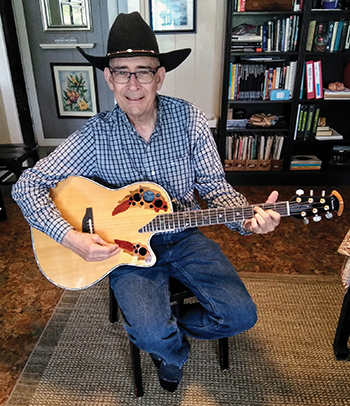Merkel Cell Carcinoma Survivor
Immunotherapy Helps Survivor Become The Comeback King
 Being diagnosed at 66 with Merkel cell carcinoma, a rare and aggressive type of skin cancer, was difficult for Gary King to accept. Given only six months to live, he tried conventional treatments. But when it continued spreading, his oncologist recommended an immunotherapy that was showing great promise treating this type of cancer. Within four treatments, the tumors were gone. Today, Gary is a huge proponent for immunotherapy and encourages others to try it. He is retired and living happily with his wife of more than 40 years.
Being diagnosed at 66 with Merkel cell carcinoma, a rare and aggressive type of skin cancer, was difficult for Gary King to accept. Given only six months to live, he tried conventional treatments. But when it continued spreading, his oncologist recommended an immunotherapy that was showing great promise treating this type of cancer. Within four treatments, the tumors were gone. Today, Gary is a huge proponent for immunotherapy and encourages others to try it. He is retired and living happily with his wife of more than 40 years.
One day while combing my hair, I felt a small bump on the back of my head on the right side. It felt like a pimple so I didn’t think too much about it. About a week or two later, I noticed it had gotten bigger. I asked my youngest son, who is a nursing aide, and my wife to look at it. We thought it might be a pimple, cyst or a boil, but it wasn’t red and didn’t have any pus.
It continued to grow. About a month later, I called a dermatologist. She said it was not a cyst because it wasn’t filled with liquid. She sent a sample to pathology, and six days later on December 27, 2016, she told me it was Merkel cell carcinoma, a rare and aggressive type of skin cancer. She explained it has a very poor outcome and that I was “in trouble.” She connected me right away with a surgeon.
I’m a Vietnam veteran who flew medivac helicopters during the war, and I was never frightened then. But, hearing I had cancer scared me. I was afraid I was going to die.
I had the bump removed a week or so later. The surgery left a perfect circle, about the size of a mayonnaise jar lid, on the back of my head. The reconstructive surgeon created a scalp flap to cover the hole from the original surgery, then grafted a piece of skin from my thigh to my scalp. She secured everything in place with 50 staples.
Two weeks later, all the lymph nodes on the right side of my neck were removed. I followed that with 30 radiation treatments. I am not a claustrophobic person, but having that cage molded to your face and strapped down can definitely be scary. The music they piped into the room during my treatment helped. I had requested The Eagles. During the nine-minute treatment, I listened to “Hotel California,” “Peaceful Easy Feeling” and “Witchy Woman.” Knowing the songs helped me to know how much longer I had left in the treatment.
One month later, a PET revealed seven tumors, one in each femur, two in my liver and three in my lower vertebrae. I was officially diagnosed with Stage IV Merkel cell carcinoma and given only six months to live. I was devastated.
My oncologist suggested an immunotherapy that had just been approved. He explained the immunotherapy removes the mask from the cancer cells so your immune system can see them. Once the mask is gone, your immune system puts on its boxing gloves and beats up the cancer.
He advocated for me when my insurance declined to pay for it, and he was successful. I received my first dose on July 20, 2017, and continued treatment every three weeks.
A follow-up PET on October 5 overwhelmed the doctor. He said it wasn’t good news. It was great news! He said my scan was dark as coal, meaning there was no sign of cancer. In technical terms, the tumors had been resolved.
I was in shock, but this time, it was the good kind. Within four treatments, I had gone from Stage IV cancer to remission. It was incredible!
Because this cancer often returns, I’ve continued the treatments with a growing number of weeks between doses. My doctor plans to keep me on it until I reach my five-year diagnosis anniversary.
The side effects are manageable. I am a bit short of breath when I first get up in the morning, but it goes away. My back and chest get itchy, but it’s nothing a good stick can’t take care of. I sneeze more, and always in threes. My sleep, appetite and energy are mostly unaffected. And, I get my infusion and drive myself home the same day.
Don’t wait to get something checked out by a medical professional. And, always consider getting a second opinion. It may be helpful to find a research doctor who is more knowledgeable about immunotherapy. Go to reputable online resources to find more information. If you’re not sure which ones, ask your doctor. There is an abundance of misinformation out there.
Immunotherapy is amazing. To me, it is the drug find of the century. If your doctor doesn’t bring it up as a potential treatment or doesn’t want to try it, ask why. It could be because it may not work for you, but you have nothing to lose by asking. Take charge, and don’t give up. It helped me come back from Stage IV cancer.


